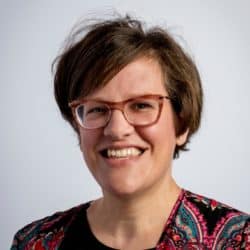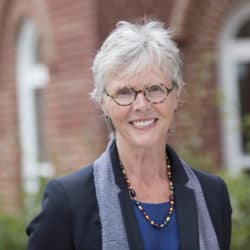As we mark the 150th anniversary of confederation, The Philanthropist is profiling Canadians from across the non-profit sector and putting a face to 150 individuals who work or volunteer in Canada’s social sector.
Name: Farah Fancy
Current role in the sector: Co-founder of Le Groupe Herencias based in Montreal, that inspires with arts to create more inclusive societies through the promotion, exchange and acceptance of identity, culture and heritage.
Years working and/or volunteering in the nonprofit sector: 25 years.
What was your first job in the sector or a defining moment?
In one of my first jobs, I was tasked with finding ways to have non-active holocaust survivors participate in therapeutic programming. I designed and facilitated a drop-in program that utilized a combination of reminiscence, movement and drama. After a few weeks, I was told, “We know you are a Muslim, but we like what you do anyway.” At this moment I knew personally I was on the right track and that the arts are a means to break down barriers even when the walls are very high.
Describe your desk/workspace.
My workspace cannot be defined by a location or objects that surround me, because I do not work in an office. Rather my workspace is a headspace that I can take with me wherever I am working. It is an empathic cycle of attention, intention, decision, precision, and action that repeats on an endless creative loop until broken either by constraints of time or need for sleep.
What are you reading or following that has expanded your understanding of the non-profit sector?
My understanding of the non-profit sector has most vastly expanded by reading the body language and facial expressions of those who share a conversation with me. That kind of reading is somewhat challenging at times, but also greatly rewarding when insight beyond words has evolved. However, I challenge myself to resist “hungry Listening”, which is extracting knowledge as a resource or commodity to be ruled over and held, as asserted by Dylan Robinson. What we read is important to then give away, as knowledge is a gift that not all are lucky enough to hold.
What do you think our sector needs to be thinking about?
Inclusion and innovation. I am interested in including the voices not always heard; the forgotten; those on the fringe; and the ones who were here first. The more axis of inclusion the sector looks at, the greater chance of new innovations arising to the surface. The easiest way to reproduce a drawing is to turn it upside down. Sometimes when we change the perspective of how we look at things, the solution is not as complicated. By inviting those not always asked to the table, imagine what we can accomplish to make the invisible visible.
Do you know someone we should profile as part of this series? Email us at philanthropistprofiles@gmail.com


